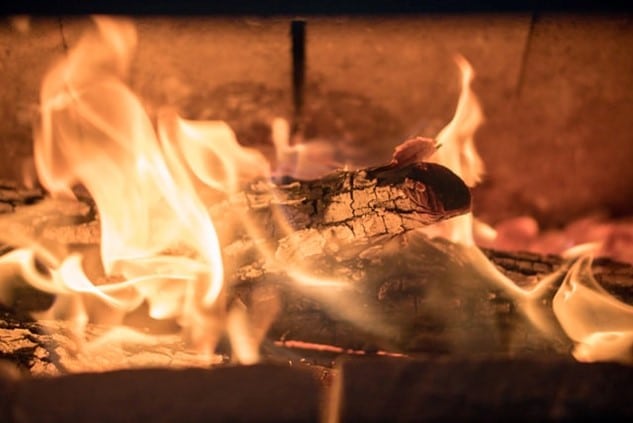Winter time is a time when we all snuggle up in front of the fire and turn on some extra heating around the home.
However, this time of year can also expose our homes to more fire hazards than usual.
In Portugal, the vast majority of fires occur during lunch and dinner when you switch on your kitchen appliances. However, the vast majority of deaths and serious injuries occur during night time because that’s when you get caught off-guard.
In monitoring urban fires, we can see that many start in the early hours of the morning, and often initial reports from firefighters at the scene indicate that heating equipment was likely the cause.
It is, therefore, important to be aware of fire risks, especially during the colder weather, and take the necessary actions to reduce such risks and protect your home, yourself and family.
The following is based on information provided by the ANEPC (national emergency and civil protection authority) and firefighters.
Heating
Many domestic accidents and deaths are due to the effect of carbon monoxide, a toxic gas which is odourless and colourless.
It is important to properly protect the fireplace so that it does not cause a household fire. If using fireplaces, salamanders or gas equipment, maintain correct ventilation in rooms in order to avoid the accumulation of harmful gas, and before bed or leaving the house, make sure you have put out wood and charcoal fires, and turn off heating equipment in order to avoid possible fires. Regularly check the condition of the door seals on wood-burning stoves and pellet fires.
If using gas bottles, regularly check the flexible rubber tubes, which must comply with the requirements set out in standard NP 4436, and not exceed 1.5 metres in length. They are valid for five years from the date of manufacture.
Smoke, carbon monoxide alarms and fire extinguishers
It’s essential that you have a smoke alarm on each floor of your home, and that you check them regularly. Every home should also have at least one fire extinguisher rated for all fire types (look for A-B-C rating on the label).
The latest fire extinguishers are the ABF Foam Fire Extinguishers. They give you the added advantage that they are easier to clean-up after use than dry powder, have less conductivity compared to water, resulting in less damage if sprayed on electrical equipment.
If you have a fuel-burning appliance, including an open fire, make sure to have a carbon monoxide alarm installed. You should have one in every room that contains a stove or open fire. Smoke detectors can save lives in the event of a house fire. It’s important for homeowners to check their smoke detector batteries quarterly, to ensure their smoke detectors are still functioning.
If someone has symptoms of poisoning, contact the Anti-poison Information Centre: 800 250 250 or, in serious cases, contact 112.
Electrical
Many of us have probably already taken our electric blankets out of the cupboard this winter. It’s important you switch off your electric blanket before going to sleep, unless it has thermostatic controls which are safe for all-night use. If any of the wires seem damaged or worn, replace the electric blanket.
To safeguard you and your home this winter, make sure that you don’t overload your power sockets or plug an extension lead into another extension lead. Make sure to check the rating of your extension leads before use; most will be ‘13A’, which means they cannot handle more than 13 amps or 3000 watts of power at a time.
Cooking
Cooking is the source of a great number of house fires. During this time of year, we’re all using our ovens and stoves more often. Pots and pans can very easily overheat if left unattended on the hob, so if you must leave the room, be sure to turn the heat off and move the pot or pan to a heat-resistant surface. Remember to always keep the area around your cooker completely free from combustible items, such as napkins, tea towels and food packaging, when cooking.
In the event of a grease fire, never attempt to extinguish it with water. Water and oil don’t mix – the water will sink to the bottom of the pan and evaporate straight away whilst causing the burning grease to disperse and spread – instead use a fire blanket to smother the flames.
If you don’t own a fire blanket, buy one – it’s money well spent. You can also use a large cloth or damp blanket (not nylon- or polyester-based) as a last resort and cover the fire completely, eventually extinguishing it by the absence of oxygen.
Fireplaces and chimneys
If you have an open fire, be sure to have your chimney cleaned and inspected at least once a year. Ensure stoves and boilers are serviced regularly by a professional.
Candles
There are so many smells that we associate with the winter season; fresh fig, cinnamon, spiced quince and gingerbread, for example. And it has become increasingly popular to use scented candles in our homes all year round. It’s very easy to forget to blow out candles, especially at night time. A simple alternative are LED tea lights.
However, if you must use real candles, make sure they fit securely into candleholders and keep them well away from anything flammable.
Smoking
Cigarettes cause a vast number of house fires. If you must smoke, try to do so outside because smouldering cigarette butts is extremely dangerous if left near flammable surfaces. Alternatively, keep some water in your ashtrays to ensure the cigarette butts are fully extinguished.
Family
Make sure to keep lighters and matches well out of reach of children and teach them about fire safety. Create a safety and escape plan for the family to follow in the event of a fire. Make sure that family members know how to use a fire extinguisher and fire blanket.
Have a happy and safe new year!
By David Thomas
|| features@algarveresident.com
David Thomas is a former Assistant Commissioner of the Hong Kong Police, consultant to INTERPOL and the United Nations Office on Drugs and Crime.
In 2011, he founded Safe Communities Algarve to help the authorities and the community prevent crime. It is now registered as Associação SCP Safe Communities Portugal, the first national association of its type in Portugal.
913 045 093
info@safecommunitiesalgarve.com
www.safecommunitiesportugal.com




















